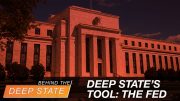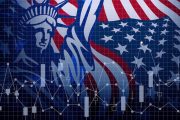As concerns over the U.S. dollar and the Federal Reserve continue to grow, U.S. lawmakers explored sound money, competing currencies, and the route to monetary freedom during an August 2 congressional hearing chaired by Rep. Ron Paul (R-Texas). It was the final House Domestic Monetary Policy Subcommittee hearing led by the long-time champion of honest currency and reining in the controversial Fed, but analysts say the impact of Rep. Paul’s work is only just starting to be felt.
Entitled “Sound Money: Parallel Currencies and the Roadmap to Monetary Freedom,” the hearing featured powerful testimony from several expert witnesses. But Rep. Paul, almost single-handedly responsible for sparking the ongoing nationwide debate about monetary policy, offered his own thoughts on the issue as well, slamming central planning and calling for honest money as a precursor to free markets and true liberty.
“One of the most pressing issues of our time is the push for monetary freedom,” Rep. Paul said in his opening statement, citing Austrian economist Ludwig von Mises — widely considered one of the most important advocates of free markets in history. “The only sound monetary system is one which protects sound money and allows consumers, businesses, and investors the freedom to transact in the currency of their choice.”
The popular GOP congressman, who attracted millions of followers during his bid for the Republican presidential nomination, also took the opportunity to slam the Fed and its wild policies — trillions of dollars in bailouts for foreign banks, unprecedented currency printing, and a shroud of secrecy. In just under 100 years, Rep. Paul observed, the central bank has destroyed more than 95 percent of the dollar’s value. And that insidious process benefits the elite while impoverishing regular Americans, he said.
“The American people have suffered for decades from the declining purchasing power of the dollar. The Federal Reserve has abused its position as the monopolist issuer of currency to enrich Wall Street and impoverish Main Street,” Paul explained, echoing a tsunami of bipartisan anti-Fed outrage that erupted in recent years. “The Fed can effectively create money out of thin air with impunity, while creators of gold and silver currencies face jail time. This is a travesty.”
According to Paul, the only way to stabilize the economy is by returning to monetary freedom and legalizing constitutional money. And until the U.S. government and the Fed get out of the way so the American people can choose what money to use without government coercion, the economy will never be truly stable and the supposed “recovery” will be “illusory,” he added.
Meanwhile, other nations are already catching on to the hoax even as Americans lack the freedoms that citizens in some other parts of the world have to invest and protect their wealth from inflation. “The solution to this problem is to legalize monetary freedom and allow the circulation of parallel and competing currencies,” Paul said.
The experts called to testify during the hearing largely agreed. Some of them had even harsher criticism about the disastrous monetary restrictions currently being inflicted upon the American people.
Executive Director Robert Gray of the American Open Currency Standard, a group working to accelerate the wider adoption of sound alternative currencies, for example, referred to the “current private central bank and the men in government who allow it to exist” as “thieves” who are robbing the American people. Calling it a “life and death” matter, Gray urged lawmakers to understand the scam that is the Fed’s modern-day “money” — a currency based on debt that is essentially a trap, as the debts can never be repaid.
The Constitution, which states that Congress has the power to coin and regulate the value of money, is supposed to be lawmakers’ “employee handbook,” Gray explained. However, legislators — or “employees,” as Gray referred to them — have utterly failed to abide by it, he said. And it is time for real change.
“Since the creation of the Federal Reserve and Congress’ abdication of their responsibility, the dollar has lost 98% of its value,” he continued. “I don’t suspect anyone would call that stellar job performance. I must be blunt and say that, as employees, Congress, you have not been successful in your charge to ‘…coin money and regulate the value thereof…’ and therefore your services in this area are no longer needed.”
In his prepared testimony, Gray also touted the benefits of free markets and competition in currency. The Fed and lawmakers, meanwhile, will slowly become irrelevant as people learn to think outside the box and reject the fraudulent monetary system, he added, asking Congress to stay out of the way and allow citizens to develop their own solutions.
“The bottom line is simple: humanity is not going to wait for permission to survive,” Gray concluded. “Things that cannot go on forever… won’t. The market will move on — with or without you. And, based on your rate of success to date, our preference is without you.”
Another expert, Nathan Lewis — principal with Kiku Capital Management and author of Gold: The Once and Future Money — said he would back the reintroduction of a gold standard. However, he also noted, advocates of economic manipulation such as Fed boss Ben Bernanke prefer to manipulate the economy using monetary gimmicks instead.
Other countries are already making moves toward establishing at least a partial gold standard, Lewis observed, citing several examples. And historically, studies show that fiat currencies tend to disappear in less than three decades on average; Federal Reserve Notes have been completely free from the constraints of gold for about 40 years so far. Countless economists, however, believe that trouble has been brewing for quite some time.
“If the United States government wishes to retain its leadership role in world monetary affairs, I suggest that this alternative be created in the United States — either by federal or state governments themselves, or by allowing private institutions to do so,” he said in prepared remarks. “Otherwise, governments that are clearly establishing the foundation for a future dollar alternative, likely based on gold, will take that role in the future.”
Alternative media of exchange, meanwhile, should be a high priority. “The concept of parallel currencies, including those based on gold, within the United States seems to be relatively uncontroversial among the economic mainstream,” Lewis explained.
However, federal and state authorities have made it hard to use precious metals as money due to onerous taxes and regulations. Lewis suggested that Congress pass legislation — perhaps similar to a law adopted in Utah recognizing precious metals as legal tender — legalizing the use of gold and silver as currency across America.
Northwood University economics professor Dr. Richard Ebeling actually offered detailed policy proposals that Congress could adopt to restore monetary freedom. He advocated, among other measures, repealing the controversial Federal Reserve Act of 1913 and all related legislation purporting to grant monopoly control over the monetary system.
Also on the list of prescriptions were the repeal of “legal tender” laws in order to let people decide for themselves what to use as a medium of exchange; repealing all restrictions on the entry into banking, while eliminating countless rules purporting to restrict private banks from issuing their own currencies or opening accounts denominated in alternative currencies.
Finally, Dr. Ebeling also proposed abolishing the Federal Deposit Insurance Corporation (FDIC) and allowing market participants to reach their own voluntary agreements. A lawmaker expressed skepticism about the idea, but during questioning, Ebeling offered several reasons why the government-run insurance scheme should be consigned to the dustbin of history.
During his prepared remarks, the recognized Austrian-economics expert also recounted a brief history of the contemporary monetary system. He then argued that, in a free market, the state should have virtually no role in money. “Central banking is a form of central planning — with the same defects,” he explained, adding that “governments and political authorities … saw in its control an ability to plunder the wealth of entire populations.”
Markets, of course, generally prevent the effects of bad decisions from dramatically afflicting the broader economy. “One of the strongest arguments that advocates of the free market have made over the last 200 years has been to point out the benefits of competition and the harmfulness of government-supported monopoly,” Dr. Ebeling noted.
“Under government central planning, however, errors committed by the central planners are more likely to have an impact on the economy as a whole,” he said. “Every sector of the economy is directly interlocked within the centrally planned blueprint for the allocation of resources, the quantities of different goods and services to be produced, and the distribution of the output to the consuming public.”
Because government has monopolized the monetary system, he continued, nobody really knows what consumers and suppliers would choose to do in the market for money and banking — but the failed monopoly system has doubtless prevented the emergence of far more efficient and high-quality solutions. There are indeed many possibilities for what might have emerged, and better decisions would certainly have been made under a free system rather than under central planning.
“Competition is thwarted by government monopoly money, and the creative possibilities that only free competition can discover remain invisible ‘might-have-beens,’” he said, calling monetary central planning one of the “last vestiges of generally accepted out-and-out socialist central planning in the world.” And even if the central planners could somehow be shielded from the power of ideology and special interests, he added, there is “no way to successfully centrally manage the monetary system.”
The central planners, for example, can never properly determine what the “optimal” quantity of money should be any more than they could accurately plan the optimal supply and prices of regular consumer goods. “The best monetary policy, therefore, is no monetary policy at all,” Dr. Ebeling concluded. “In the absence of government regulation and monopoly control, a free monetary and banking system would exist; it would not have to be created, designed, or supported.”
In his position as chairman of the monetary policy subcommittee, Rep. Paul, perhaps the most well-known and influential foe of the Fed, has held numerous hearings to advance the cause of honest and sound money. Earlier this year, he chaired a widely celebrated hearing to examine legislative proposals on what to do with the central bank itself: reform or abolish. As the author of the book End the Fed, Rep. Paul’s position is clear.
With the outcry over the central bank growing louder than ever, supporters hope that instituting competing currencies and auditing the secretive institution could hasten its final demise — and just last month, Paul’s “audit the Fed” bill was overwhelmingly approved by the House. The central bank, of course, has shown that it will fight hard to preserve its powers and secrecy. But despite Rep. Paul deciding to retire from the House at the end of this term, the battle for monetary freedom he led in Congress for decades may be just getting started.
Related articles:
Congress Debates the Federal Reserve: Reform or Abolish?
Competing Currencies Would Expand Freedom While Limiting Government
Gold, Silver Now Legal Tender in Utah
Greeks Adopt Alternative Currencies as Economy Implodes
Fed Manipulations in the Crosshairs
U.S. Fed Bailout of Euro Prompts New Push for Audit & Sound Money
GOP Lawmaker Unveils New Effort to Rein in Fed
Fed Audit: Trillions For Foreign Banks, Conflicts of Interest




